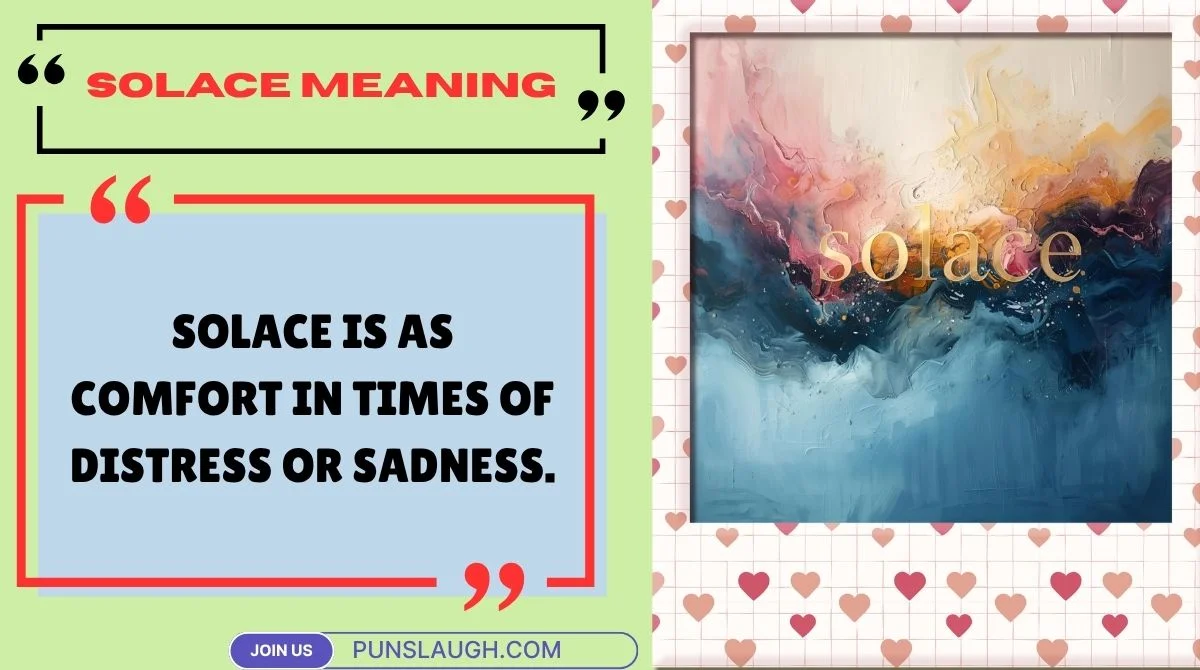Life often throws challenges our way—loss, uncertainty, stress. In such moments, people look for solace.
The word isn’t just a poetic expression; it captures a deeply human need for comfort, relief, and inner peace.
In this guide, we’ll explore:
- The true meaning of solace
- Its origins and history
- How it appears in spirituality, relationships, culture, and languages
- Practical ways to find solace in daily life
🌱 Core Definition of Solace
The simplest way to understand solace is as comfort in times of distress or sadness.
In English, solace can be both a noun and a verb:
- As a noun: “Music was her solace after a tough day.”
- As a verb: “He tried to solace his grieving friend.”
Here’s a quick comparison:
| Word | Part of Speech | Meaning | Example Sentence |
|---|---|---|---|
| Solace | Noun | Comfort or relief during distress | Nature brought her solace after the loss |
| Solace | Verb | To give comfort or console | The teacher’s words solaced the students |
| Comfort | Noun | A state of physical or emotional ease | A warm blanket brought comfort |
| Consolation | Noun | Something that lessens grief or disappointment | A kind gesture offered consolation |
👉 Key Point:
While “comfort” is a general sense of ease, solace often implies emotional or spiritual relief during hardship.
📜 Word Origin and Etymology of Solace
The journey of this word is fascinating:
- Comes from Latin: solacium meaning “comfort, consolation.”
- Moved into Old French: solas or solacier, meaning “to comfort.”
- Entered Middle English around the 14th century as solace.
Over time, the meaning has remained surprisingly consistent—comfort and relief during sorrow.
This historical consistency shows how central the concept of solace is to the human experience.
🌸 Deeper Understanding: What “Finding Solace” Really Means
Finding solace isn’t just about feeling better temporarily.
It’s about discovering a source of lasting comfort or peace, often tied to acceptance, understanding, or connection.
Examples of Finding Solace:
- A grieving parent finding solace in supporting others
- Someone turning to nature’s quiet beauty for emotional healing
- Finding solace in prayer, meditation, or artistic expression
👉 Important Insight:
Solace isn’t a quick distraction. Unlike entertainment or escapism, it addresses the heart of the pain.
🙏 Spiritual and Religious Contexts of Solace
🌟 God-Given Solace
Many faith traditions describe solace as a divine gift—a sense of peace that surpasses human understanding.
For instance:
- In Christianity, solace is often linked with the Holy Spirit as the “Comforter.”
- In Islam, believers find solace in dhikr (remembrance of God) and prayer.
- In Buddhism, solace often comes from acceptance of impermanence and mindfulness.
📖 Solace Meaning in the Bible
While the English word “solace” itself appears rarely, the concept runs deep throughout scripture.
Some notable references:
- Psalm 23:4 – “Even though I walk through the valley of the shadow of death, I will fear no evil, for you are with me…”
- 2 Corinthians 1:3-4 – speaks of God as the “Father of compassion and the God of all comfort.”
👉 These passages highlight that spiritual solace often comes from faith in divine presence and purpose.
🌌 Eternal Solace
The phrase “eternal solace” refers to the idea of everlasting peace or comfort, often associated with the afterlife.
Writers and theologians use it to describe:
- A state of peace after suffering
- The hope of rest and reunion beyond this life
💞 Solace in Human Relationships
❤️ Solace in Love
Love can be one of the greatest sources of solace.
Whether from a partner, a friend, or family, genuine care provides emotional shelter during life’s storms.
Case Study:
During the Great Depression in the 1930s, countless families reported that strong emotional bonds provided solace even amid poverty and hardship.
💪 Strength and Solace
There’s a profound connection between inner strength and finding solace.
Often, solace nurtures strength—and vice versa.
Quotes like this capture the link well:
“Out of suffering have emerged the strongest souls; the most massive characters are seared with scars.” – Khalil Gibran
🕊️ Peace and Solace
Peace and solace often overlap but are not identical.
- Peace is a broader state of harmony and calm.
- Solace is the comfort that leads toward peace, especially after pain or loss.
Modern mental health research supports practices such as mindfulness, gratitude journaling, and supportive relationships as ways to foster both peace and solace.
📚 Popular Phrases and Cultural References
✍️ “My Only Solace” & “I Find Solace”
These phrases emphasize a singular, often deeply personal source of comfort.
Examples:
- “Books were my only solace during the long recovery.”
- “I find solace in painting when words fail.”
🎬 “Quantum of Solace”
The phrase gained global recognition through the James Bond film (2008) but predates it.
Originally, “quantum of solace” means the smallest amount of comfort that can make a difference in an otherwise unbearable situation.
This reflects the idea that even a tiny measure of comfort can sustain hope.
🌎 Linguistic and Cross-Cultural Perspectives
📖 Solace Meaning in English
In British English, solace often retains a slightly more poetic tone.
In American English, it’s widely used in both literature and everyday language.
🌍 Solace in Other Languages
| Language | Word for “Solace” | Literal Meaning / Nuance |
|---|---|---|
| Spanish | Consuelo | Comfort or consolation |
| French | Réconfort / Solace | Emotional or spiritual support |
| German | Trost | Deep, sustaining comfort |
| Arabic | عزاء (‘aza’) | Consolation, often in the context of loss |
| Japanese | 慰め (Nagusame) | Consolation or soothing comfort |
👉 Note how most cultures have a concept of solace, though the emotional nuance varies.
🪷 Solace as a Name
“Solace” is sometimes used as a given name, symbolizing peace, hope, and emotional refuge.
It has grown in popularity in recent decades as parents seek meaningful, virtue-based names.
🌟 Practical Ways to Seek Solace in Daily Life
Finding genuine solace requires intentional choices.
Healthy Practices:
- Spending time in nature: The quiet of green spaces often calms the mind.
- Mindfulness or prayer: Creates a sense of connection and acceptance.
- Community support: Friends, family, or support groups offer empathy and understanding.
- Creative outlets: Art, writing, or music can express emotions and foster healing.
- Professional therapy: Helps process trauma or grief constructively.
Avoid Unhealthy Substitutes:
Relying on alcohol, substance use, or excessive distractions may numb pain but doesn’t provide real solace.
❓ FAQs about Solace Meaning
What does solace truly mean?
Solace means deep comfort and relief in times of sorrow, distress, or pain. It goes beyond surface-level distractions.
How is solace different from comfort?
Comfort can be physical or emotional ease. Solace specifically refers to emotional or spiritual comfort during difficult times.
Can solace be temporary?
Yes, solace can be brief—like kind words from a friend—but it can also lead to long-term healing when paired with understanding and acceptance.
Is solace always tied to religion?
Not necessarily. While many find solace in faith, others find it in nature, relationships, personal reflection, or creative pursuits.
Why is finding solace important for mental health?
Finding solace helps people process grief, reduce stress, and regain emotional balance, which supports overall well-being.
🌟 Conclusion
From ancient scriptures to modern therapy rooms, solace remains a universal human need.
It’s the gentle force that helps people rise after falling, hope after loss, and find calm in chaos.
👉 The search for solace reminds us that no one needs to face life’s hardships alone.
Whether found in faith, nature, relationships, or creativity, solace continues to offer the comfort we all seek.





